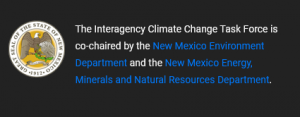NM Faith Leaders Add Their Voices to Letter Urging Congress to Pass Sustainable Infrastructure Bill
More than 40 New Mexicans were among the hundreds of faith leaders nationwide who signed a letter to House Speaker Nancy Pelosi and Senate Majority Leader Chuck Schumer urging Congress to pass a bold economic recovery and infrastructure package that creates family and community sustaining jobs while caring for our climate and our neighbors.
We urge you to support historic levels of investment that will safeguard Creation, address the impacts of climate change and pollution from fossil fuel extraction and related industries, and fulfill our moral obligation to leave a habitable world for future generations. Black, Indigenous, and people of color(BIPOC) and low-income communities have been hit the hardest by the triple health, economic,and environmental crises we face. The needs of these communities must be at the center of any infrastructure package.
Read full letter
Read quotes from four national faith leaders
In New Mexico, faith leaders from Albuquerque, Santa Fe, Las Cruces, Taos, Carlsbad, Raton, Chapparral, Jemez Springs, Gallup signed the letter. A separate version of the letter will go directly to our congressional delegation.
Rev. Talitha Arnold, United Church of Santa Fe
Tanya Barlow, United Methodist Women Conference Vice President, New Mexico Conference
Rev. Dr. Holly Beaumont, InterfaithWorker Justice – New Mexico
Carolyn Begay, United Methodist Women Conference Spiritual Growth Coordinator, New Mexico Conference
Reverend Judy Bierbaum,
Rev Ronald Brooker, Evangelical Lutheran Church in America
Joan Brown, Executive Director Sr.,Order Of St. Francis, New Mexico Interfaith Power & Light
Rose Marie Cecchini, Mm, Sr.,Maryknoll Sisters
Alfred Chavez, St. Joseph on the Rio Grande Parish
Dr. Gene Chorostecki
Rev. Edward Church, Church of the Good Shepherd, Albuquerque,
Catherine Clemons, Sister, Catholic Church in Mobile, Alabama
Rev. Dr. Kenneth Cuthbertson, Presbyterian Church (U.S.A.) – retired
Rev. Jean Darling, Unitarian Universalist Congregation of Santa Fe
Rev. Dr. Gregory Gaertner, Evangelical Lutheran Church in America
Andrew Gold, Maggid, Kol Ha Lev’
Dr. Michael Gregory
Dr. D. Hart
Caroline Mb Hess, Bahá’ís of the East Mountain
Rev Sue Joiner, First Congregational United Church of Christ
Rev. B. Gail Joralemon, First Congregational United Church of Christ, Albuquerque
Nicholas King, Pastor, Carlsbad Mennonite Church
Rev. George Kunkle, St. Bede’s Episcopal Church
The Rev. Benjamin Larzelere, Evangelical Lutheran Church in America(Evangelical Lutheran Church inAmerica) Retired
Rev. Erica Lea-Simka, Albuquerque Mennonite Church
Dr. Reeve Love
Dr. Alston Lundgren, Retired
Rev James Marshall
Patricia Masterman, Deacon, Holy Family Episcopal Church
Anne Morawski, Pastor, Holy Cross Lutheran Church Evangelical Lutheran Church in America
Dr. Nathan Nielsen
Dr. A. Obermeier
Rev. George Packard, Wisconsin Conference United Methodist Church
Nancy Poe, Raton United Methodist Church
Rev. Dr. Dusty Pruitt, United Church of Christ
Rabbi Harry Rosenfeld, Congregation Albert
Dr. Emily Rothman,
Anne Salaun, Sr., Assumption Sisters Chaparral NM
Laura Sandison, Albuquerque, NM
Rev. Pamela Shepherd, Taos United Community Church
Charlotte Smith, Baha’i
Sue Stefford-Grey, President of the Board, First Christian Church in Las Cruces, New Mexico
Dr. Shari Tarbet
Rev. Glen Thamert, Jemez Peacemakers
The Rev. Daniel J. Webster, Episcopal Church

